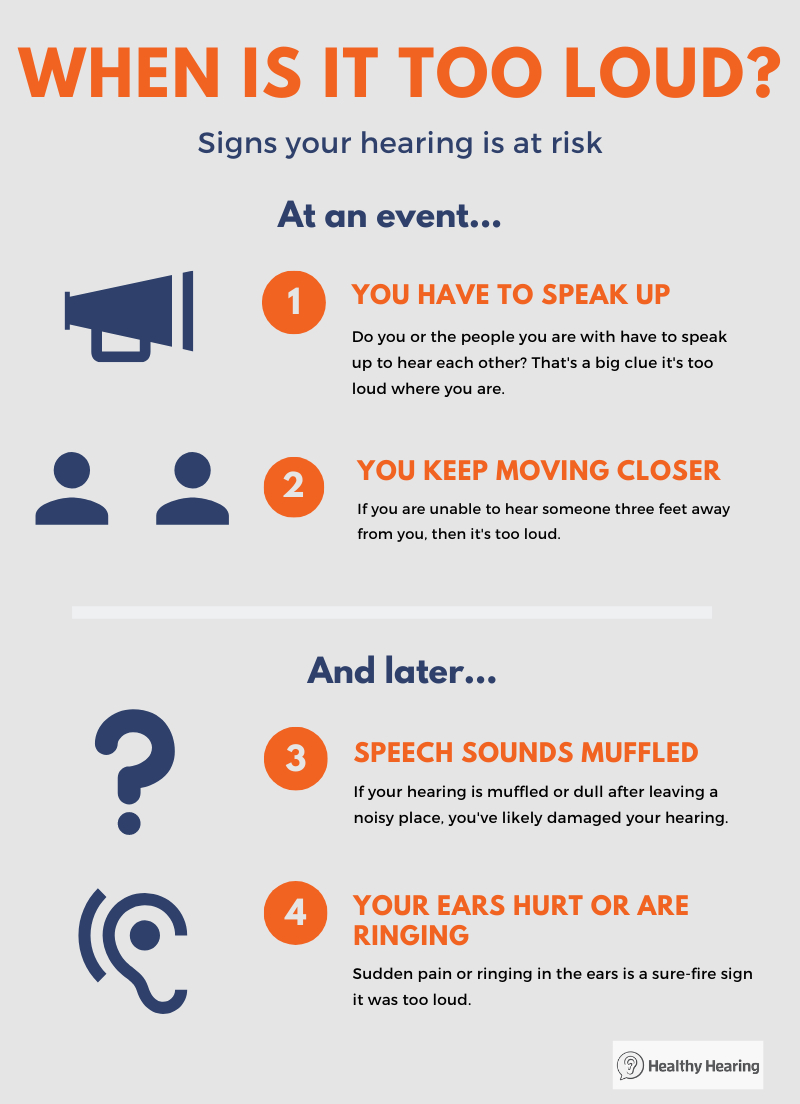While not all types of hearing loss are preventable, there are steps you can take to lower your risk of developing age-related hearing loss and/or noise-induced hearing loss.
It’s never too early—or too late—to begin wearing hearing protection around loud noises. And adopting a healthy lifestyle and following your doctor’s advice can go a long way to protecting your hearing health.
We can’t stress enough the importance of reducing your exposure to loud noise (more on that, below) but there are other healthy habits that will also help you preserve your hearing as you get older:
Table of Contents
7 lifestyle tips to help prevent hearing loss

habits like regular exercise.
Your inner ear contains delicate hair-like cells that are quite sensitive to changes in blood flow. If these cells are damaged, you experience hearing loss. The healthier you are overall, the better you can prevent hearing loss—or preserve the hearing you do have, if you already have hearing loss.
1. Manage your blood pressure and cardiac health
High blood pressure and heart disease can damage the fragile mechanisms inside your ear that help you hear. If you have high cholesterol or blood pressure, follow your doctor’s treatment orders to get it under control.
2. Stop smoking and vaping, and limit drinking
Studies definitively show that cigarette smoke—whether directly, secondhand, or even in utero—can have a big impact on a person’s hearing health. Likewise with heavy alcohol use, which can create a toxic environment in the ear. Vaping and hearing loss isn’t as well-studied, but there are anecdotal reports linking it to sudden hearing loss.
3. Keep diabetes under control
Research has shown that people with diabetes are twice as likely to have hearing loss. Just as with high blood pressure, diabetes can damage the cells in your inner ears. Keep your blood sugar under control and follow your doctor’s orders for managing diabetes.
4. Exercise and practice stress reduction
What isn’t exercise helpful for? Exercise improves blood flow and helps your body—and your ear health—in countless ways. (Just be careful about loud music and incorrect weightlifting at the gym; both are linked to hearing damage.) And because chronic high levels of stress aren’t good for your hearing (or the rest of you), do what you can to keep stress levels under control.
5. Eat foods high in certain vitamins and minerals
Did you know that several vitamins, especially B12, are vital to good hearing? The same is true of minerals including potassium and magnesium. Iron-deficiency anemia is linked to losing your hearing so try to eat a diet rich in iron.
6. Know your family history
While knowing your family history won’t directly prevent hearing loss, it will help you know if you’re at elevated risk. Catching it early can reduce your risk of the negative impacts of hearing loss, such as cognitive decline, depression and social isolation.
7. Be aware of drugs that cause hearing loss
Hundreds of over-the-counter and prescription drugs are linked to hearing loss. These ototoxic drugs range from ordinary, over-the-counter medications like aspirin to chemotherapy drugs and IV antibiotics. In some cases, you may be able to take an alternative drug to reduce your risk of drug-related hearing loss.
Lower your risk of noise-induced hearing loss (NIHL)
Even if you’re as healthy as an Olympian and eat salads all day long, you still risk hearing damage if you don’t protect your hearing in noisy environments. Regardless of your age or your hearing status, it’s always a good idea to protect your hearing when you’re going to be exposed to loud sounds. There is nothing more damaging to your hearing.
Common sources of NIHL
Noise-induced hearing loss can have many sources. Blasts, like gunfire or fireworks, can cause immediate hearing loss. Less explosive sounds, such as airplane engines, rock concerts, or even high-pitched dentist drills, still cause damage, just more slowly. Either way, the damage is almost always irreversible and cumulative.
One common source of hearing damage you might not even realize? Your earbuds and headphones, especially if you don’t take the right precautions when you listen to music.
How can you protect your hearing?
Plan to use hearing protection like earmuffs and earplugs anytime you’ll be immersed in loud sounds. (Gun enthusiasts should wear both!) Not only do you reduce your risk of hearing loss, you may also stave off tinnitus, or ringing in the ears. If you work in a noisy place—for example, at a hair salon with blow dryers constantly in use and music blaring in the background—find out if your employer offers noise protection, or bring your own. You’ll thank us later!
How to know if it’s too loud
Anything over 85 decibels can cause hearing loss. That’s roughly equivalent to standing in city traffic or pushing a lawnmower. If you’re out and about and have a smartphone, these apps can help you measure the sound around you. And the following guidelines are good to keep in mind:

If a situation feels too loud, it probably is. Beyond that, watch for these signs:
- You need to raise your voice to be heard
- You are unable to hear someone three feet away from you
- Speech around you sounds muffled or dull after leaving a noisy place
- You experience pain or ringing in your ears (tinnitus) after being in a noisy place
Get a hearing test
Preventing hearing loss means being proactive in your approach to hearing health. If you wouldn’t hesitate to have your eyes or teeth checked, it is time to add regular hearing exams to your list of check-ups. If your test indicates you already have some hearing loss, you can begin taking action to prevent it from getting worse. If you need hearing aids, your hearing professional can discuss the best options for your hearing loss, lifestyle and budget.
Lifelong hearing health starts with you.
Pay attention to noise levels at work and at play. There’s no need to stop enjoying the hobbies you love if you can take reasonable steps to protect your ears from noise.
If you need a baseline hearing test, or if you suspect you may already have some hearing loss, visit our extensive directory to find a dedicated hearing healthcare professional near you.


